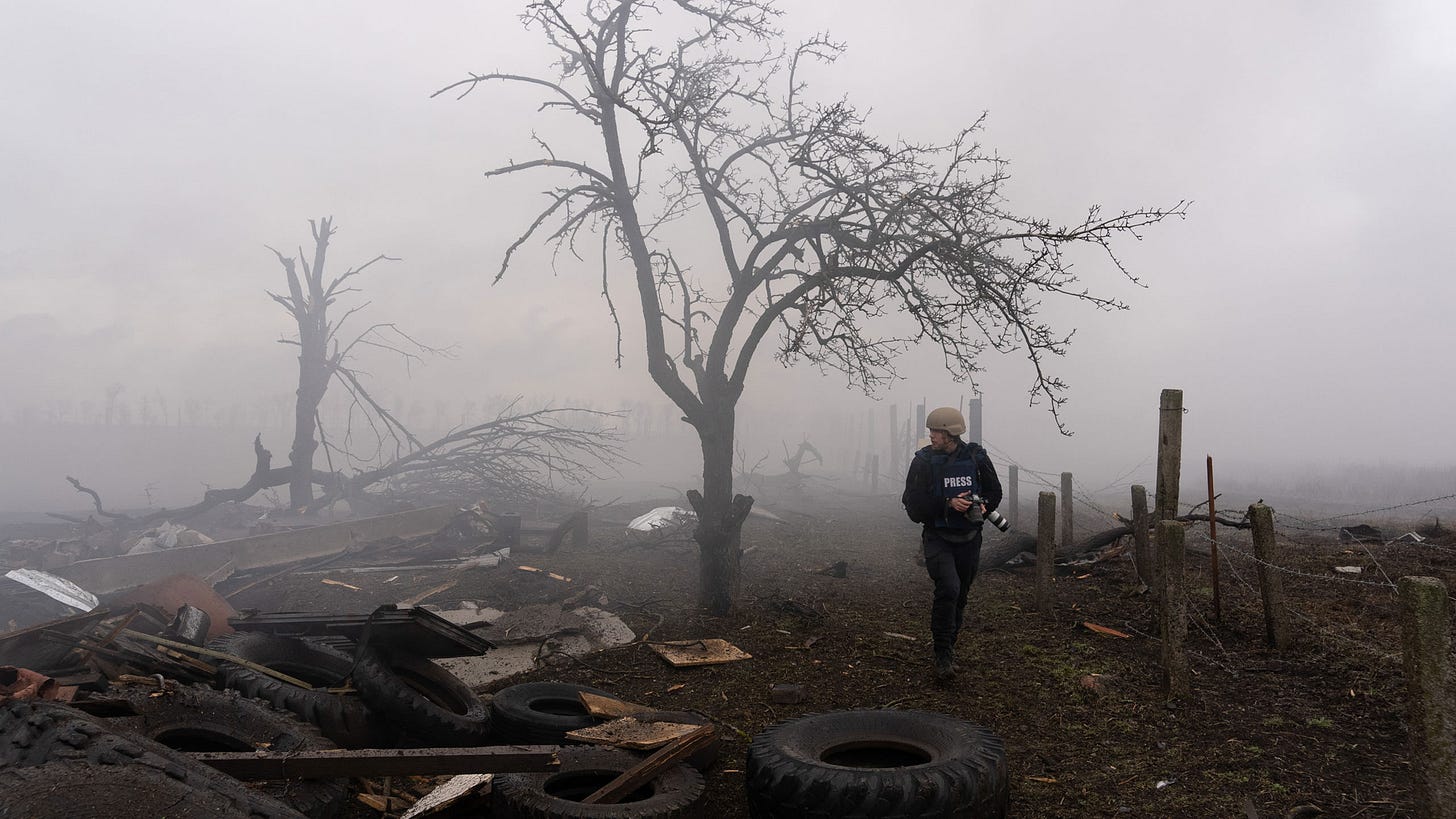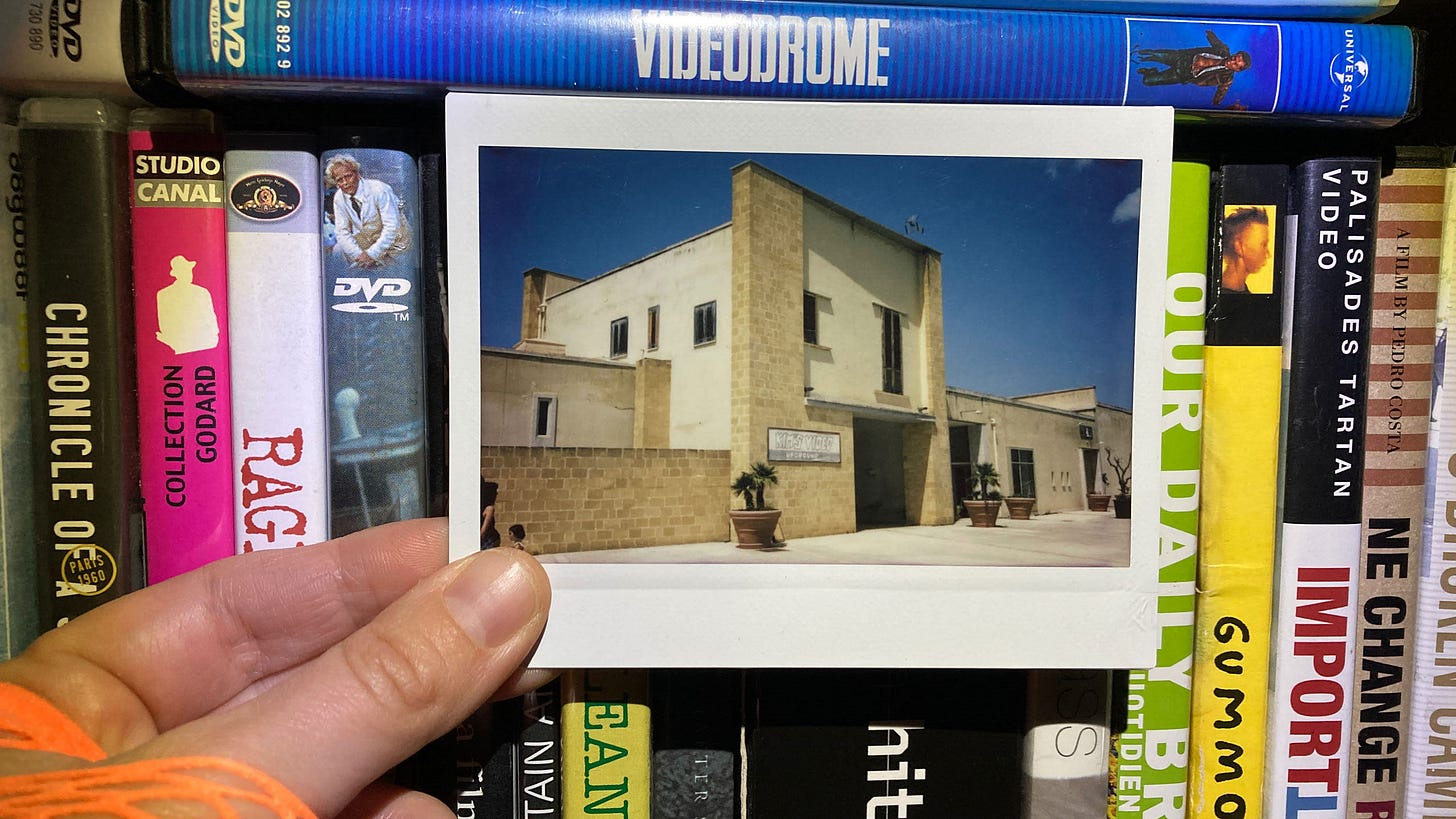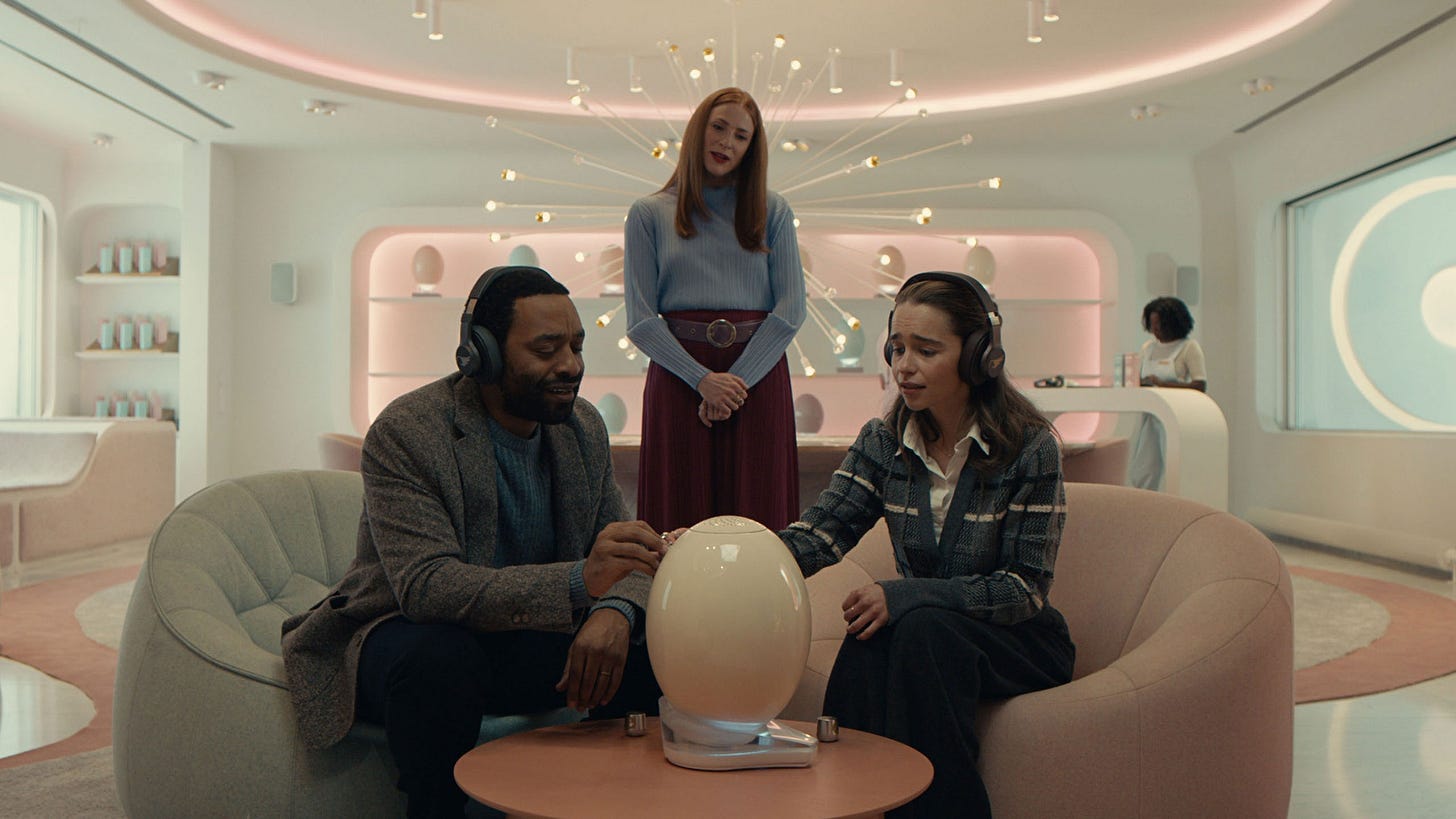Sundance 2023 Report, Part III
The fest's best documentaries: "20 Days in Mariupol," "Food and Country," "Kim's Video," and more.
I have this odd and rather silly failing of memory: Every time I come to a film festival like Sundance, I arrive looking forward to the narrative features, and every time I find myself surprised at how good the documentaries are – how gripping and/or entertaining and/or simply compelling as a record of human experience. And they’re almost always richer than fiction because the stories that real life generates as a matter of daily cause and effect are always more unpredictable than the ones our feeble little brains can invent.
Sometimes those stories are beyond our comprehension or willingness to grasp. “20 Days in Mariupol” (⭐ ⭐ ⭐ 1/2, above), AP reporter Mstyslav Chernov’s first-person footage of the opening days of Russia’s invasion of Ukraine, is a bone-chilling documentation of war crimes carried out from afar on innocent civilians. The film is a collaboration between the Associated Press and PBS’s “Frontline” – it will air on the latter later this year – but I have to imagine the cut that played at Sundance will be softened for broadcast, so disturbing is some of what we see: a toddler dying from injuries sustained in a missile strike, a teenage boy whose leg was blown off as he was playing soccer, the women and children of a bombed maternity hospital. You may find some of these images familiar, since a fair amount of Chernov’s footage (and stills captured by his associate, photographer Evgeniy Maloletka, above) made it to US and international broadcasts and newspapers in the early days of 2022; the film includes some of those news clips as a reminder of the journalists’ essential brief: to witness and to disseminate the witnessing.
“20 Days in Mariupol” provides a chronological throughline missing from the nightly news reports, though, and while we never see Chernov’s face, his lucid, worried voiceover provides a personal aspect to the film – he’s living what he’s documenting as much as any of the Ukrainians whose world is being pounded into blood and twisted metal. An obtrusive musical score is the one false note (as it were), since any editorial mickey-mousing can’t help but feel shallow next to the stark horror of an entire city being murdered. Otherwise, “20 Days in Mariupol” is exemplary journalism and irrefutable evidence for the Hague.
Less grim but no less important, “Food and Country” (⭐ ⭐ ⭐ 1/2) is a spirited cri du coeur against the American way of eating, with restaurant critic/food activist Ruth Reichl serving as the film’s chief investigator, gadfly, cheerleader, and star. (Laura Gabbert is the director and, with Reichl, a co-producer.) It’s also the rare documentary that allows for a measure of hope, as Reichl and the people she interviews – restaurant owner-chefs and organic farmers, maverick ranchers and qualified academics – come out of the ruinous early days of the pandemic (and Trump-administration agricultural policies) battered but more resilient than before. In the process, we get a crash course in the history of postwar food, focusing on the long tail of 1970s Secretary of Agriculture Earl Butz’s radical prioritizing of corporate farming and cheap production – “Get big or get out” he told growers — over independent farmers and nutritional value. Against that, we see the slow growth of the farm-to-table movement under the auspices of author-chefs like Alice Waters, Reichl’s longtime friend and practically the movie’s co-star.
Reichl is feisty, funny, and compassionate, allowing herself and, by extension, us to care deeply about her subjects’ lives. Some of them probably voted for Trump; the force-of-nature Bronx farmer Karen Washington probably didn’t. It doesn’t matter. What counts is that they’re all engaged in a long-term struggle for America’s stomach, palate, and wallet that “Food and Country” convinces us can be won. The movie is in Park City seeking a distribution deal that it richly deserves, since its appeal is the very opposite of niche. The only people who need to see this movie are people who eat.
“Kim’s Video” (⭐ ⭐ ⭐) is not a crucial missive from the front lines or a thoughtful agit-doc. It’s just a trip – the long, strange trip of a film collection 55,000 titles strong from New York’s Lower East Side to a tiny Italian village and back again. If you lived in Manhattan in the 1980s and you loved movies, you sooner or later made your way to Kim’s, whose flagship store was on Avenue A and E. 6th St. and whose inventory was a VHS education in film history, esoteric cinema, genre trash, and the virtues of bootlegged videos. The place was a legend, with legendarily obstreperous clerks, some of whom (Alex Ross Perry, Todd Phillips) went on to become filmmakers themselves, as did some of the customers (Quentin Tarantino, Jim Jarmusch). The Kim’s empire, overseen by eccentric Korean businessman Yongman Kim, flourished into the first years of the new millennium, when it was brought down by government anti-piracy raids, the rise of streaming video, and gentrification; in 2008, Mr. Kim offered to donate the collection to any entity that would make it available to Kim’s members in perpetuity, and Salemi, a small town in Sicily anxious to raise its cultural profile, took him up on it.
Here is where directors David Redmon and Ashley Sabin come in. Curious about where this invaluable trove of cinema had gone to, they traveled to Salemi and found the Kim’s videos lying unboxed and unstored in a water-damaged civic building. And this is where “Kim’s Video” boldly pioneers a brand-new genre – the documentary heist flick – as the filmmakers and their friends vow to liberate and relocate all 55,000 titles to someplace that will treat them with the archival reverence they deserve. The sight of this wrecking crew carrying out the theft while wearing masks of their favorite filmmakers – Alfred Hitchcock, Agnes Varda, Maya Deren – is a testament to cheerfully demented movie love. Did I mention that the Mafia figures in this somehow? As well as a jillion clips from the films Redmon and Sabin love so much that they try to will their own documentary into a reverse-engineered Kim’s Video of its own? More enthusiastic than competent, strictly speaking, “Kim’s Video” is still a tonic for lovers of psychotronic cinema in all its forms. N.B. The Kim’s Video collection now resides in the Alamo Drafthouse cinema in lower Manhattan, while “Kim’s Video” screens in Park City hoping to find distribution.
Thumbnail reviews of other Sundance films I have seen, enjoyed, or suffered through.
“Animalia” (⭐ ⭐ ⭐) – Visually stunning parable about a pampered, pregnant rich man’s wife (Oumäima Barid) forced out onto a magical-realist road trip while some kind of alien apocalypse unfolds just over the horizon. A striking debut for French Moroccan writer-director Sofia Alaoui. (Seeking distribution.)
“Fancy Dance” (⭐ ⭐ 1/2) – Indigenous actress Lily Gladstone (below right) – soon to be seen in Martin Scorsese’s “Killers of the Flower Moon” – is excellent in writer-director Erica Tremblay’s solid indie drama about a woman rescuing her niece (Isabel Deroy-Olson, below left) from foster care and running from the law. (Seeking distribution.)
“Fremont” (⭐ ⭐ 1/2) – Very, very Sundance comedy drama about a young Afghanistan refugee (the appealing Anaita Wali Zada) – an army translator relocated to America – struggling to make sense of her life and her job writing fortunes for a fortune cookie factory. Filmed in black and white because of course it is. Featuring an appearance by Jeremy Allen White (Carmy from “The Bear”). (Seeking distribution.)
“Passages” (⭐ 1/2) – Wearying Paris-set melodrama about a threesome between a self-absorbed filmmaker (Franz Rogowski, below right), his artist boyfriend (Ben Whishaw, below left), and a young schoolteacher (Adele Exarchopoulos). A misfire from director Ira Sachs, sunk by an irritating, uninteresting lead. Oh, to see what Fassbinder might have done with this. (Picked up by online art-film streamer MUBI, which will release it theatrically later this year.)
“The Pod Generation” (⭐ ⭐) – In the near future, a married couple (Emilia Clarke of “Game of Thrones” and Chiwetel Ejiofor, below) decide to have a baby the newfangled way, with an external pod incubator. A mild-mannered dystopian satire, and if that sounds like an oxymoron, it is. (Seeking distribution.)
“Polite Society” (⭐ ⭐ ⭐) – Cute but exhaustingly over-the-top British action-comedy from first-time writer-director Nida Manzoor about a Pakistani teenager who dreams of being a stuntwoman and who plots to rescue her sister from an arranged marriage. Lead actress Priya Kansara is energetic and adorable, and the various comic martial-arts showdowns position this as a Bollywood-style version of “Scott Pilgrim vs the World.” (In theaters April 28.)
“Radical” (⭐ ⭐ 1/2) – The festival’s opening-night film was this engaging Mexican entry in the Inspirational Educator genre, with Eugenio Derbez (“CODA”) and a cast of talented kids giving their all to a film that never quite convinces you that you haven’t seen it several times before. (Seeking distribution.)
“Rye Lane” (⭐ ⭐ ⭐) – Not unlike “Polite Society” (above), this is a whimsical, high-energy London-set debut from a talented new filmmaker (Raine Allen-Miller). A zippy romantic comedy that sometimes gets too manic, it rests on the considerable charms of lead actors David Jonsson and Vivian Oparah. (In theaters March 31.)
We now return you to your regular Watch List.
Thoughts? Don’t hesitate to weigh in.
If you enjoyed this edition of Ty Burr’s Watch List, please feel free to pass it along to friends.
If you’re not a paying subscriber and would like to sign up for additional postings and to join the discussions, here’s how.







